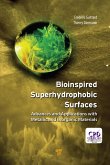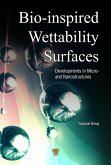This book provides a broad, multidisciplinary introduction to water at interfaces, focusing on its molecular nature. It is written for practicing scientists and engineers who want a fundamental understanding of what water does at surfaces and interfaces. It covers a host of examples to convey general principles, including the hydrophobicity and hydrophilicity of materials, the special structure of interfacial water for biological and electrochemical processes, the role of water at biosurfaces (DNA, proteins, and membranes), friction and adhesion, marine aerosols, ice formation, wetting-dewetting, and filtration.
Dieser Download kann aus rechtlichen Gründen nur mit Rechnungsadresse in A, B, BG, CY, CZ, D, DK, EW, E, FIN, F, GR, HR, H, IRL, I, LT, L, LR, M, NL, PL, P, R, S, SLO, SK ausgeliefert werden.









